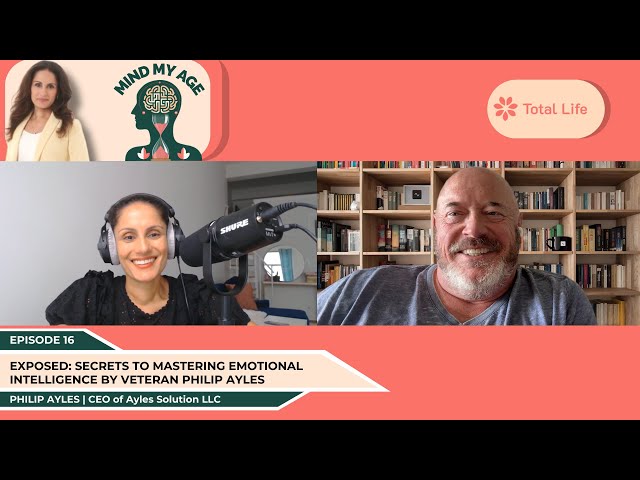In this “Mind My Age” podcast episode, Neelam Brar talks with Dr. John E. Lewis. He’s an expert in nutrition, brain health, and immune function. This podcast, presented by Total Life, explores how our lifestyle affects our brain and how long we live. Dr. Lewis shares his knowledge on exercise, nutrition, and research on polysaccharides and brain function.
How Old Do You Feel? The Importance of Mindset in Aging
Dr. Lewis feels much younger than his age, thanks to daily exercise. He believes that taking care of your body is essential. “You have to make time to take care of your body. Otherwise, you’re no good to yourself or anyone else,” he says. His active lifestyle shows how important exercise is for staying young and energetic.
The Role of Consistency and Intensity in Exercise
For Dr. Lewis, exercising is as routine as brushing his teeth. He believes in being consistent and intense in workouts. Beginners should start with simple activities like walking and gradually increase the intensity.
“You need to be consistent and then hit a certain level of intensity that stimulates adaptation in the body,” he advises. He aims to make exercise a daily habit for better health.
Breakthroughs in Brain Health Research: The Power of Polysaccharides
His research focuses on polysaccharides from aloe vera and rice bran. These compounds have shown great potential in improving brain function. His findings are especially promising for those with Alzheimer’s disease.
Polysaccharides differ from simple sugars and can boost immune function and reduce inflammation. “We showed improvements in cognitive function… in people with moderate to severe Alzheimer’s disease,” he shares.
Dietary Recommendations for Brain Health and Longevity
He recommends aloe vera and rice bran for their polysaccharides. However, getting these nutrients from food can be challenging. Supplements can help, but he also suggests eating various colourful foods.
He advises ” eating the rainbow” to get a range of nutrients important for brain health. Supplements can fill nutritional gaps, especially for those with specific dietary needs.
Common Misconceptions about Nutrition
Many believe animal protein is key for health. But Dr Lewis has thrived on a plant-based diet for 27 years. He points out that switching to plant-based protein can increase longevity.
“If you switch from animal to plant protein, you increase longevity,” Dr. Lewis says. He encourages focusing on plant-based options for better health.
The Debate in High-Protein Diets: Carnivore, Keto, and Plant-Based Perspectives
High-protein diets like carnivore and keto often focus on animal proteins. Dr Lewis believes plant-based proteins offer unique benefits, especially in reducing ageing effects. Animal proteins can accelerate ageing, a fact frequently overlooked by pro-carnivore and keto diet advocates.
“The carnivore, keto, paleo crowd tend to ignore… They don’t talk about longevity,” he points out. He stresses that the source of protein is crucial for long-term health.
Simple Steps to Improve Daily Health
Dr Lewis offers simple tips for better health. Start with daily exercise, like walking, and add nutrient-rich foods or supplements. He emphasizes making health a priority.
“You just have to make it a priority… We’re meant to move.” This reminder encourages building sustainable habits for lasting health improvements.
The Debate Around Plant-Based Diets
Dr Lewis believes in plant-based diets for their health benefits. They help lower the risks of diseases like heart disease, cancer, diabetes, and dementia. He says, “Eating more plants is good for you… it lowers major disease risks.”
Research supports his view, showing people who eat more plants live longer and healthier. He warns against relying too much on studies like “The China Study” without questioning their methods.
The Role of Vitamin D in Health
Vitamin D is key, affecting over 4,500 genes in our bodies. Dr. Lewis notes the high levels of vitamin D deficiency, especially in places with little sunlight. He suggests daily sun exposure or supplements to keep levels up.
He points out that vitamin D is important for more than just bones. It’s crucial for almost every bodily function.
Fiber and Gut Health
Many Americans need more fibre, a problem as we age. Dr Lewis stresses fibre’s role in digestion and metabolism. He recommends eating unprocessed vegetables for the best fibre.
“Not enough fibre means you’re not pooping right,” he warns. “Waste buildup can cause problems over time.” He emphasizes the importance of gut health for overall well-being.
The Importance of Hydration
Chronic dehydration is a big issue but often ignored. He says staying hydrated is key for metabolism and offers tips like always carrying a water bottle. Everyone’s hydration needs differ, but drinking water regularly improves health.
Examining the Benefits and Risks of Fasting
Fasting, like intermittent fasting, is popular for its health benefits. Dr. Lewis talks about Valter Longo’s research on fasting’s metabolic benefits. However, he suggests starting with short fasts to get used to it.
Autophagy: Understanding the Cellular Cleansing Process
Autophagy is how our bodies clean out damaged cells and make new ones. Dr Lewis says it’s important but warns against too much. “Autophagy is like spring cleaning for cells, but too much is bad,” he says. He advocates for a balanced approach to health.
Bridging the Health Span-Lifespan Gap
Dr Lewis believes small, consistent changes can improve lifespan and health. He suggests focusing on movement, nutrition, and brain health. These steps can lead to a healthier, longer life.
Conclusion
In this episode of “Mind My Age,” Dr. Lewis shares insights on exercise, nutrition, and brain health for longevity. We can improve our well-being by adopting consistent habits and making smart food choices. Follow the “Mind My Age” podcast for more health and ageing discussions. Remember, every small change helps towards a healthier future.










